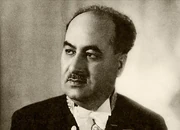
Nichifor Crainic (pseudonym of Ion Dobre; December 22, 1889, Bulbucata, Giurgiu County – August 20, 1972, Mogoșoaia) was a Romanian writer, editor, philosopher, poet, theologian and academician famed for his traditionalist and antisemitic activities. Crainic was also a professor of theology at the Bucharest Theological Seminary and the Chişinău Faculty of Theology. Crainic was a contributor of poetry to the modernist magazine Gândirea. After become disenfranchised with the progressive views of the publication, rather than disassociate with the magazine he became increasingly intertwined in leadership positions in order to de-modernize it.
At the end of a series of intellectual sparing within the publication itself, Crainic managed to wrest control of the magazine and institute a sea-change in editorial character supporting mystical Orthodoxy. He developed an ideology given the name Gândirism (from gând – "thought"), a nationalist and neo-Orthodox Christian social and cultural trend. He also collaborated with numerous other publications such as Ramuri, România Nouă, Cuvântul, and Sfarmă-Piatră. He was also the editor in chief of the newspaper Calendarul.
Nichifor Crainic became a leading pro-Fascist figure in the political turmoil of the late 1930s, openly praising Mussolini and Hitler. He was a convinced antisemite, although he claimed his prejudice to be a defense of the Gospels rather than a vision of racial hierarchies. His beliefs were a major influence on the Iron Guard legionary movement, although Crainic viewed himself as a supporter of the legionnaires' rival King Carol II. In a 1938 essay, he theoretised the "ethnocratic state" as applied to Romania.
In 1940 he was elected member of the Romanian Academy. He studied Theology at the Seminary in Bucharest, and received his Ph.D. diploma from the University of Vienna. He was appointed Minister of Propaganda for the Ion Antonescu regime's anti-Jewish pogroms and actively sought the "removal" (killing) of Romanians of Jewish origin. After the Soviet army defeated the Germans and occupied Romania, Crainic went into hiding. A trial was conducted in his absence and he was found guilty of crimes against the people. He was eventually caught and imprisoned by the authorities of Communist Romania in 1947, and spent 15 years in Văcăreşti and Aiud prisons. He was expelled from the Academy by the Communist regime.
Between 1962 and 1968 he was the editor of the Communist propaganda magazine "Glasul Patriei" (The voice of motherland) - a magazine published in Romania by the Romanian Communist regime but sold only abroad, which they used as a tool to try to influence the Romanian intellectual émigrés to be patriotic and not work against the Communist Romania. It is believed that he was forced to be an informer for the feared Romanian secret police, the Securitate, after his release from prison.